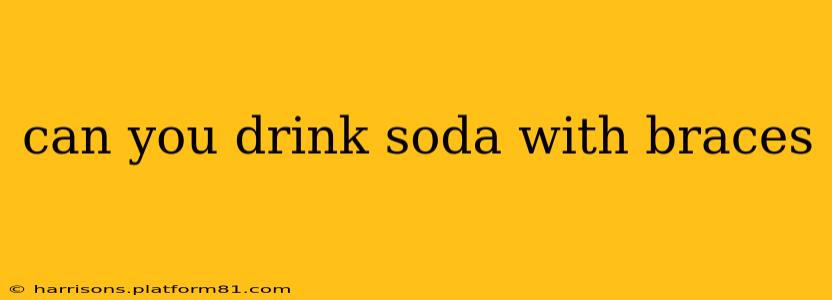Can You Drink Soda with Braces? A Comprehensive Guide
The short answer is: no, you shouldn't drink soda with braces. While it might seem like a minor indulgence, sugary sodas pose significant risks to your oral health, especially when you're wearing braces. This article will delve into the reasons why, exploring the potential damage and offering alternatives.
Why is soda bad for braces?
Soda's detrimental effects on teeth are well-documented, and these effects are amplified when you're wearing braces. Here's why:
-
High Sugar Content: The high sugar content in soda feeds the bacteria in your mouth, leading to plaque buildup. This plaque can contribute to cavities and gum disease, both of which are more difficult to treat when you have braces. The sticky nature of the sugar can also cling to the brackets and wires, making it harder to clean effectively.
-
Acidity: Soda is highly acidic, eroding tooth enamel over time. This erosion is accelerated by the presence of braces, as the brackets and wires can trap the acidic liquid against your teeth for extended periods. The weakened enamel is more susceptible to cavities and staining.
-
Increased Risk of White Spots: The acidic nature of soda can also lead to the formation of white spots on your teeth, a cosmetic issue that can be difficult to remedy. These spots are essentially demineralized areas of enamel.
-
Difficulty Cleaning: The brackets and wires of braces create more nooks and crannies where food particles and sugar can become trapped. This makes cleaning significantly more challenging, increasing the risk of cavities and gum disease. Soda only exacerbates this problem.
What are the long-term effects of drinking soda with braces?
Ignoring the risks of consuming soda while wearing braces can lead to several long-term problems:
-
Extensive Tooth Decay: Untreated cavities can lead to significant tooth decay, requiring extensive fillings or even extractions.
-
Gum Disease (Gingivitis/Periodontitis): The buildup of plaque and bacteria can inflame the gums, potentially leading to gingivitis (gum inflammation) or even periodontitis (a more severe form of gum disease that can damage the bone supporting your teeth).
-
Permanent Staining: The sugars and acids in soda can stain your teeth, making them appear discolored, even after your braces are removed. This staining can be particularly noticeable around the brackets and wires.
-
Prolonged Treatment Time: Severe dental problems arising from soda consumption can necessitate adjustments to your orthodontic treatment plan, potentially lengthening the overall time you need to wear braces.
What drinks are better alternatives to soda while wearing braces?
Switching to healthier alternatives is crucial for maintaining good oral hygiene during your orthodontic treatment. Here are some better choices:
-
Water: Plain water is the best option. It helps rinse away food particles and neutralizes acids in your mouth.
-
Unsweetened Tea: Avoid sugary varieties; opt for unsweetened herbal teas or green tea.
-
Milk: Milk contains calcium and other nutrients that help strengthen teeth.
-
Clear Fruit Juices (in moderation): These are preferable to sodas, but limit consumption due to their sugar content. Rinse your mouth thoroughly with water afterward.
Can I have diet soda with braces?
While diet sodas are sugar-free, they still contain acids that can erode tooth enamel. While perhaps a slightly better option than regular soda, it’s still best to avoid them. The acids remain a significant risk factor.
What should I do if I accidentally drink soda with braces?
If you accidentally consume soda, rinse your mouth thoroughly with water afterward. Increase your brushing and flossing frequency to help remove any remaining sugar and food particles. You should also diligently use an interdental brush to clean around your brackets and wires.
In conclusion, while the occasional slip-up might happen, regularly drinking soda with braces significantly increases the risk of various oral health problems. Choosing healthier alternatives is vital for protecting your teeth and ensuring a successful orthodontic experience. Remember to consult with your orthodontist for personalized advice and guidance on maintaining optimal oral hygiene during your treatment.
